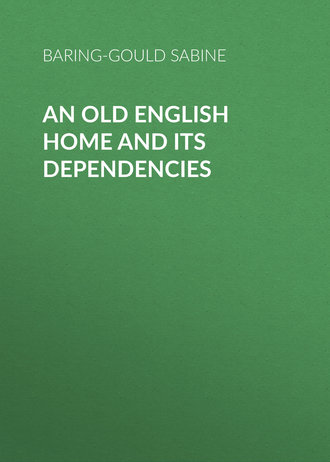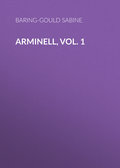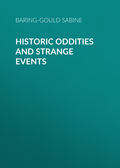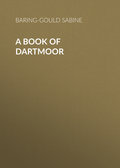
Baring-Gould Sabine
An Old English Home and Its Dependencies
And then, again, what haunts old quarries are for rabbits – and therefore also places in which boys delight to spend hours ferreting Bunny.
In connexion with a quarry I will venture to tell a story – curious, because showing a form of superstition not extinct. I tell the tale my own way, but it is fundamentally true – that is to say, it is quite true that the quarryman told it; and believed himself to have been victimized in the way I relate, though I cannot vouch for the exact words he employed.
I was examining for geological purposes a quarry in Cornwall that had been opened in the side of a hill for the extraction of stone, wherewith to metal the roads. Whilst studying the strata, I observed a sort of nick in the uppermost layer of rock, under the earth which rose above the surface of the rock some three feet six inches or four feet.
The nick was about two feet deep and the same breadth, and the sides were cut perpendicularly. It was clearly artificial, and at once struck me as being a section of a grave. There was no churchyard interfered with, so that I supposed the grave was prehistoric, and at once exclaimed to the quarryman engaged in the excavation that this was a grave. He put down his pick, and answered:
"Yes, sir, it is a grave what you see here, and what is more I can tell you whose grave it is, or was. And a coorious sarcumstance is connected with that there grave, and if you don't mind sitting down on that piece o' rock for five minutes, I'll tell you all about it."
Without paying much heed to the statement that the man made, that he knew whose last resting-place it was, I inquired whether any flint or bronze weapons had been found there.
"No, sir," said the quarryman, "nothing of the sort as far as I know; it was the head of the grave we cut through, and when we sent the pick into it, the gentleman's head came down into the quarry."
"Gentleman's head? What gentleman's head?"
"Well, sir, I did not know at the time. It gave me a lot of trouble did that head, or rather the teeth from it. If you'll be so good as to sit down on that stone, I'll tell you all about it, and I reckon it will be worth your trouble. It's a coorious story, as coorious a story as you have ever heard, I take it."
"I will listen, certainly. But excuse me one moment. I should like to crawl up the side of the quarry, and examine the grave."
"It's my lunch time, and I've nothing to do but to eat and talk for half-an-hour," said the quarry man, "so I'll tell you all the whole story, when you've been up and come down again. There be bones there. You'll find his neck; we cut off the head of the grave. But, whatever you do, leave the bones alone. Don't carry any away with you in your pocket, or you'll be just in a pretty way."
I made the exploration I required. I found that a grave had been cut in the rock. Clearly, when the interment took place, those who made the grave did not consider that there was a sufficient depth of earth, and they had accordingly cut out a hole in the rock, below the soil, to accommodate the dead man. Bones were still in situ. I could find no trace of coffin, but in all likelihood, if there had been one there, it had rotted away, and the gravelly soil from above had fallen in on all sides, and had taken the place of the wood as it decomposed. And if there had been a mound above the dead man, the sinking in after decomposition had caused it to disappear. There were bushes of heather above the grave, but nothing to indicate that a tomb had been in the place, as far as could be judged from above. Its presence would not have been guessed had it not been revealed by the operations of the quarrymen.
Having completed my observations, I returned to the bottom, and seated myself on the stone indicated by the workman. He occupied the top of another, and was engaged on a pie – an appalling composition of heavy pastry, potato, and bacon, grey in colour as a Jerusalem artichoke, and close in texture and heavy as a cannon ball. He cut large junks out of this terrible specimen of domestic cookery, and thrust them between knife and thumb into his mouth. As he opened this receptacle I observed that the gums were ill-provided with teeth, so that mastication must be imperfect. It is really extraordinary how the wives of working-men exhibit their ingenuity in proving "how not to do it." It is said that the way to a man's heart is through his stomach. If that be the case, it predicates either extraordinary personal fascination on the part of the wives, or really miraculous virtue on the part of the husbands, that any domestic attachment should subsist in the cottages of the agricultural labourer and artisan. Or is it that the wives are resolved to put the tenderness, the devotion of their men to the severest possible test, as cannon are run over a new suspension-bridge?
"You see, sir," said the quarryman, "when we cut that new slice we went slap through the head of the grave, and never knowed there was a grave there, till down came the head, like a snowball. It was my partner, James Downe, as was up there wi' his pick. Me was sitting here, and I'd just opened my bag for my dinner, when I heard James a-hollerin' to me to look out. I did look up, and seed that there skull come jumping down the side, and before I could undo my legs – I'd knotted them for my lunch, and had the bag open on my lap – down came the skull, and with one skip it flopped right among my victuals, and there it sat in my lap, looking up in my face, as innocent as a babe, so it seemed to me.
"Well, sir, I daresay you know, if you know anything – and you seem to be a learned gentleman – that there ain't a better preservative against toothache than to carry about a dead man's tooth in your pocket. Dead men's teeth don't lie about promiscuous as empty snail shells, and I'd often wished to have one. I suffer terrible from my teeth. I've been kept roving with pain night after night, and one ain't up to work when one has been kept roving all night, either with teeth or babies. Me and the church sexton ain't the best of friends. You see, I'm a Bible Christian and spiritual, and that there sexton is of the earth, earthy. I couldn't ask a favour of him, to accommodate me with a tooth if he haps to turn one up when digging a new grave. It is true we have got a cemetery of our own to the chapel, but it's new, and nothing is turned up there but earthworms. As this was the case I was uncommon joyful when that head came bouncing into my lap. I found the teeth weren't particular tight in, and with my knife I easily got a tooth or two out; I thought I'd be square all round, so I got out a back tooth – they call 'em molars up to the Board School – and an eye tooth and a front one. Then I thought I was pretty well set up and protected against toothache. I got my wife to sew 'em up in a bit o'silk and hung it round my neck. I may say this – from that day so long as I wore the dead man's teeth I never had a touch of toothache."
"And how long did you wear them?"
"Three days, sir."
"Not more? Why did you not retain them?"
"I'll tell you why, if you'll listen to me."
"Certainly. But what have you done with the skull?"
"Chucked it away. It weren't no good to nobody – least of all to the owner. And for me – I'd got out of it all I wanted."
"You have not the teeth now?"
"No. I kept them for three days and then chucked them away."
"Have you had toothache since?"
"Terrible; but I had what was wusser when I had the teeth."
"Well, go on and tell me what the wusser was."
"So I will, if you'll listen to me. Well, sir, I had them teeth done up in a bit of silk, and hung round my throat. The first night I went to bed, that was Saturday, I had the little bag round my neck. I hadn't laid my head on the pillow, before – but, I must tell you, I'm a Bible Christian, and a serious man. I'm a local, I am, and I preach in our chapel, and am generally reckoned a rousin' sort of a preacher. For, sir, I knows how to work 'em up. Well, when you understand that, you will comprehend how astonished I was when I laid my head on the pillow, to find I wasn't no more what I ought to ha' been. In the first place, I hadn't gone to bed in my clothes, and no sooner was my head on my pillow than I was in a red coat and breeches and gaiters; and what is more, in the second place, I'd laid me down to rest, and I found myself astride on a saddle, on horseback, tearin' over the country, jumpin' hedges, tally-hoin' – me, as never rode a hoss in my life, and never tally-hoed, and wouldn't do it to save my soul. I knowed all the while I was doing wrong. I knowed I'd got to preach in our chapel next evening, the Sabbath Day – and here was I in a red coat, and galloping after the hounds, and tearin' after a fox, and swearing orful! I couldn't help myself. I believe my face was as pink as my coat. I tried to compose my mouth to say Hallelujah, but I couldn't do it – I rapped out a – but, sir, I dussn't even whisper what I then swore at the top o' my voice; and I had to preach at a revival within some few hours. It was terrible – terrible!"
I saw the quarryman's face bathed in perspiration. The thought of what he had gone through affected him, and his hand shook as he heaved a lump of pasty to his quivering lips.
"I tried to think I was in the pulpit; you must understand, sir, if at a right moment you bang the cushion and kick the panels – it'll bring down sinners like over-ripe greengages. But it wor no good; I was whacking into my cob, and kicking with spurs into her flanks, and away she went over a five-barred gate – it was terrible – terrible, to a shining light, one o' the Elect People, sir, – such as be I."
The man heaved a sigh and wiped his brow and cheeks, and rose with his pudding-bag.
"All the Sabbath day after that," continued the quarryman, "I wasn't myself. It lay on my conscience that I'd done wrong; and when I preached in the evening there was no unction in me, no more, sir, than you could have greased the fly-wheel of your watch with; and usually there's quite a pomatum-pot full. I didn't feel happy, and it was with a heavy heart and a troubled head that I went to bed on the Sabbath night." He heaved another sigh, and folded up his lunch-bag.
"Will you believe it, sir? No sooner had I closed my eyes than I was in a public-house. I – I – who've been a Band of Hope ever since I was a baby. I've heard say I never took to the bottle even in earliest infancy, though it was but a bottle of milk, so ingrained in me be temperance principles. I've heard mother say she put a bit of sopped bread into a rag, and let me have that when a baby – so stubborn was I, and so furious did I kick out with my little legs when shown the bottle. It was the name, I reckon, set me against it. However, sir, there I was, just out of the pulpit at Bethesda, and in the 'Fox and Hounds' drinking. I tried to call out for Gingerade, but the words got altered in my throat to Whisky Toddy. And what was more, I was singing – roaring out at the top of my voice —
"'Come, my lads, let us be jolly,
Drive away dull melancholy;
For to grieve it is a folly
When we meet together!'"
The quarryman covered his eyes with his hands – he was ashamed to look up.
"If that wasn't bad enough, the words that followed were worse – and I a teetotaler down to the soles of my feet.
"'Here's the bottle, as it passes
Do not fail to fill your glasses;
Water drinkers are dull asses
When they're met together.
"'Milk is meet for infancy,
Ladies like to sip Bohea;
Not such stuff for you and me
When we're met together.'
"All the while I sang it I knew I was saying good-bye to my consistency, I was going against my dearest convictions. But I couldn't help myself, it was as though an evil spirit possessed me. I was myself and yet not myself. It was terrible – terrible – terrible!"
The quarryman swung his pasty bag and smote his breast with it.
"That warn't all," he continued, and lowered his tone. "There was an uncommon pretty barmaid with red rosy cheeks and curling black hair; and somehow I got my arm round her waist and was kissing her. Well, I don't so much mind about that, for kissing is scriptural, and Paul calls them kisses of peace. But these were not kisses of peace by any means – and there was the mischief, for I knowed my wife was looking on, and, sir, I knowed the consequences would be orful – orful – simply orful."
The quarryman's head sank on his knees, he clasped his hands over the back of his head, and groaned for full five minutes. Presently he looked up, pulled himself together, and continued his narrative.
"The worst of all is behind. I was very busy on Monday, as I was on Mr. Conybeare's committee. We were in for the election, and I'm tremendous strong as a Liberal, and for Home Rule, and I reckon I can influence a good many votes in my district of Cornwall. Well, sir, I'd been about canvassing for Mr. Conybeare very hard, yet all the while I had a sort of deadly fear at my heart that what I'd been doing, both hunting and drinking, and swearing and singing, and kissing the barmaid, would come out in public, or would be thrown in my teeth by the Consarvatives, and might damage the good cause. But no one said nothing about it on Monday, and towards evening my mind was more at ease.
"I was very tired when I went to bed, for I had been working, as I said, very hard indeed, and persuading of obstinate politicians is worse than breaking stones for the road, and far worse than converting of obstinate sinners. No sooner had I laid my head on the pillow than – will you believe it, sir? – I was in the full swing of the election. I didn't know it was coming on so fast. I thought it would be three weeks, but not a bit of it. They'd set up a polling place in the Board School, and there was I swaggering up to register my vote. There were placards – Unionist on one side, but I wouldn't look at them; on the other were the Radical posters – from Mr. Conybeare – and I knowed my own mind. If any man in England be true and loyal to the G.O.M. that's me. Well, sir, in I walked and gave my name. I knowed my number, and went as confident as possible into the little box of unplaned deal boards, and with my paper in one hand took the pencil in the other, wetted the pencil with my tongue to make sure it marked black enough, and then set down my cross. Will you believe it? – that sperit o' pervarsity and devilry had come over me once more, and I'd gone and voted Consarvative."
The quarryman staggered back, and I had just time to spring to his aid. He had fainted. I held him in my arms till he came round. I threw water over his face, and by degrees he was himself again.
"Orful! orful! wasn't it?" said he. "Well, sir, after that I would have nothing more to do with them teeth. They did it. I chucked 'em away; toothache would be better all night long, than the trials I had to undergo when I had them dead man's teeth about me."
"But have you not dreamed since?" I asked, looking at the pasty which, when he fainted, I had taken in my hand.
"Yes, sir, often, very often; but then my dreams since have always been Nonconformist, Temperance, and Radical dreams – and them's wholesome."
"You said something about knowing who it was whose grave you had disturbed?"
"Well, so I believe I do. I did not know at the time, but afterwards, when I began to tell my story; then there was a talk about it and a raking and a grubbing among old folks' memories, and there was an old woman who said she could throw some light on the subject. Her tale was that about a hundred years ago, or more perhaps, she could not be sure, there lived at the Old Hall one Squire Trewenna. The Hall has been pulled down because of the mines, and the Trewennas are all gone. Squire Trewenna was a terrible man for hunting and drinking, and was, moreover, a regular rory tory Conservative. He was a fast chap, and no good to nobody but to dogs and horses, and before he died he begged that he might be buried on the brink of the moor where he'd ridden so often and enjoyed himself so much, and had killed a tremendous big fox in the last hunt he ever went out in before gout got to his stomick. And he said he wanted no headstone over him, that fox and hounds and horses might go over his grave. Well, folks forgot, as there was no headstone, where he lay, exact, and old Betty Tregellas says she believes what we cut into was Squire Trewenna's grave. I think so too, for how else was it that when I had those teeth about me I was so possessed wi' a spirit of unrighteousness and drinking and Consarvatism? I reckon you've had a Board School education and been to the University, and are a larned man. Tell me, now, am I not right?"







